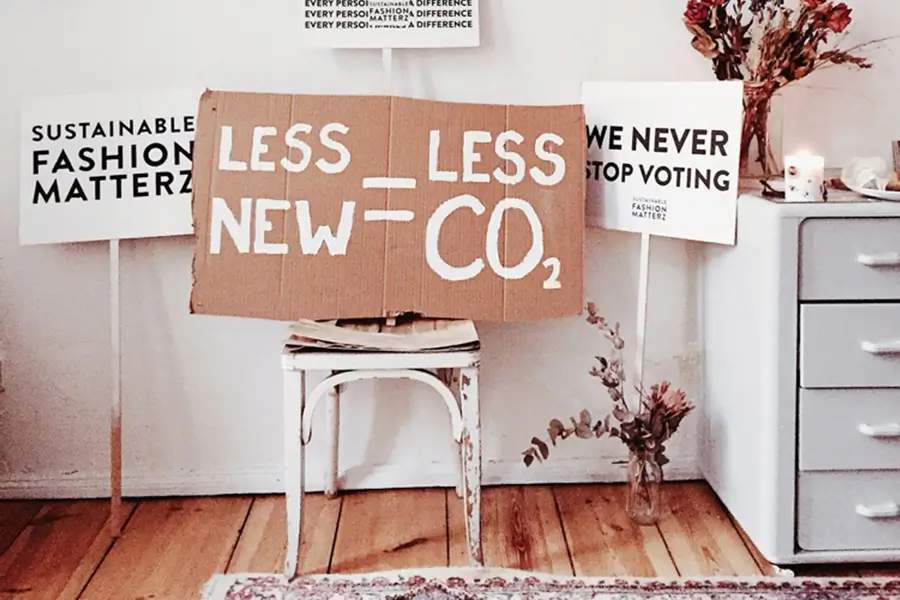
BUSINESS BASICS

Fashion is a powerful means of self-expression, but its impact on the environment and society cannot be ignored. In recent years, there has been a growing awareness of the need for sustainable fashion design – a shift towards ethical practices and environmental consciousness.
This article explores the world of sustainable fashion design, its importance, and practical steps to incorporate ethics and environmental consciousness into the fashion industry.
Sustainable fashion design is a holistic approach to creating garments and accessories that consider their impact on the planet, people, and profits. It goes beyond creating visually appealing designs to embracing ethical production processes and materials that minimize harm to the environment and respect human rights.
By adopting sustainable practices, fashion designers have the power to contribute positively to the world while still expressing their creativity.
The fashion industry is one of the largest contributors to environmental degradation and social injustices. From the excessive use of natural resources to the exploitation of workers, the negative impacts are evident.
However, there is hope for change. Sustainable fashion design offers a solution to mitigate these problems, promoting a more responsible and compassionate industry that considers the long-term consequences of its actions.
Sustainable fashion design brings forth numerous benefits for both the industry and the planet. By incorporating ethics and environmental consciousness into fashion, designers can:
To effectively implement sustainable fashion design principles, it is essential to have a clear understanding of what sustainable fashion truly means and the guiding principles behind it.
Sustainable fashion encompasses a range of practices and initiatives aimed at reducing the industry’s negative impacts. It involves considering the entire lifecycle of a garment, from its creation to its disposal.
Sustainable fashion prioritizes environmental responsibility, social equity, and economic viability.
Sustainable fashion design is guided by several core principles:
Sustainable fashion design adopts the concept of the triple bottom line, which emphasizes the interconnectedness of social, environmental, and economic aspects.
It aims to achieve a balance between the well-being of people, the preservation of the planet, and the financial sustainability of fashion businesses.
Ethical considerations play a crucial role in sustainable fashion design. By addressing ethical issues within the fashion industry, designers can contribute to a more responsible and inclusive future.
The fashion industry has been marred by numerous ethical concerns, including:
To combat these issues, ethical fashion standards and certifications have been established. These provide guidelines and assurance that fashion brands are adhering to ethical practices.
Some notable standards include:
The fashion industry’s environmental impact is significant, but sustainable fashion design offers solutions to reduce this impact and promote environmental consciousness.
The fashion industry’s environmental footprint is extensive and includes:
To address these environmental challenges, sustainable fashion design incorporates practices such as:
To truly embrace sustainable fashion design, designers need to take practical steps throughout the entire design and production process.
Selecting sustainable materials and adopting eco-friendly manufacturing processes are crucial steps in sustainable fashion design.
Circular design aims to eliminate waste and extend the lifespan of garments, forming a closed-loop system.
Education and awareness play a vital role in promoting sustainable fashion consumption.
Educating consumers about the impact of their fashion choices can drive conscious consumerism. Promoting the importance of sustainable fashion through campaigns, educational content, and events helps consumers make informed decisions.
Fashion designers can effectively communicate the value of sustainable fashion by emphasizing the positive impact their designs have on the environment, workers, and communities.
Storytelling and transparent communication build trust and connection with consumers.
Collaborating with retailers and influencers who share the values of sustainable fashion expands the reach and impact of sustainable fashion design.
By partnering with like-minded individuals and organizations, designers can amplify their message and create a collective movement towards sustainability.
Despite the many benefits of sustainable fashion design, there are challenges to overcome.
Sustainable materials and ethical labor practices can often come at a higher cost.
Balancing sustainability with affordability requires creative problem-solving, exploring cost-effective alternatives, and consumer education about the long-term value of sustainable fashion.
The availability of sustainable materials and ethical suppliers can be limited, especially for emerging designers.
Building networks, exploring innovative sourcing methods, and supporting initiatives that promote sustainability in the fashion supply chain can help address this challenge.
Shifting consumer behavior and fashion trends towards sustainability is a significant challenge.
Designers can influence this change through education, creating desirable sustainable designs, and challenging conventional notions of fashion.
The future of sustainable fashion design holds immense potential for positive change.
Advancements in technology, such as fabric innovations, recycling technologies, and supply chain traceability systems, are paving the way for more sustainable practices in fashion.
Embracing these innovations and exploring new possibilities will shape the future of sustainable fashion design.
Collaboration and knowledge sharing among designers, manufacturers, policymakers, and consumers are crucial for driving sustainable change in the fashion industry.
By working together and sharing insights, the fashion industry can overcome challenges and collectively create a more sustainable future.
As a fashion designer, you have the power to shape the future of the industry. By incorporating ethics and environmental consciousness into your designs and practices, you contribute to a more sustainable and responsible fashion world.
Embrace the principles of sustainable fashion design, educate consumers, and collaborate with like-minded individuals and organizations to create a positive impact.
Together, we can build a fashion industry that respects people and the planet, while still celebrating creativity and style.
Read More

The Art Career Project is a trusted resource for emerging and professional artists.